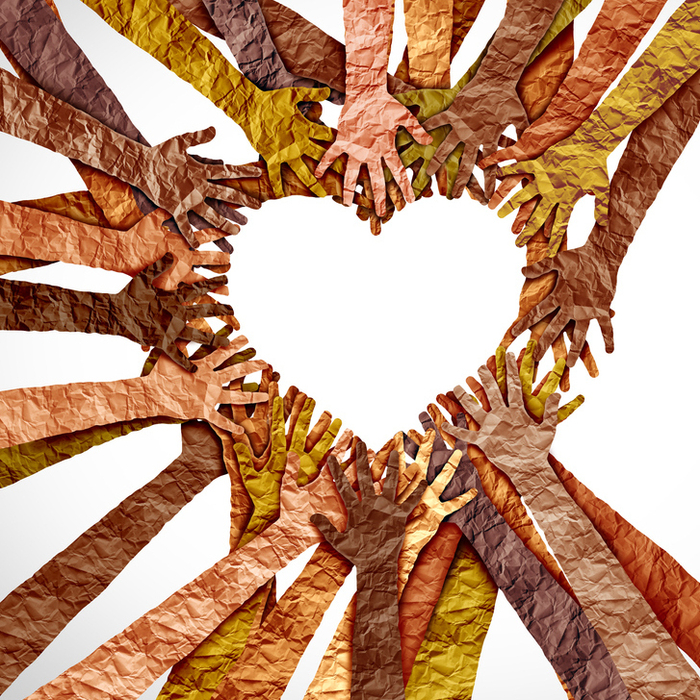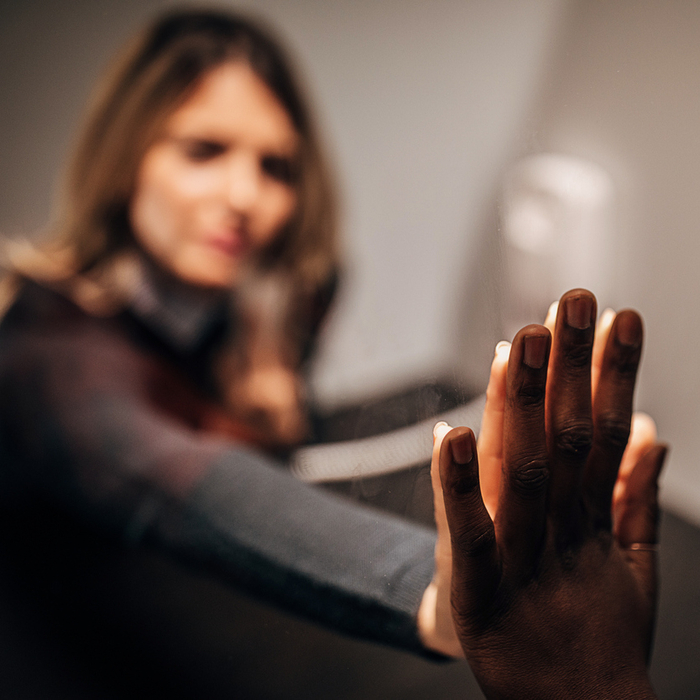Out here “in the world,” as incarcerated individuals refer to us, COVID is still real, but we have largely returned to normal social interactions. Even in the highest-risk settings, such as long-term-care facilities and schools, COVID restrictions have largely eased: Children are back to full schedules of programming, and fully vaccinated and asymptomatic visitors are welcome at nursing homes (including hugs between family members). Yes, the virus continues to circulate, but there is a broad acknowledgement that lack of human, face-to-face interaction—and touch—imposes its own, equally damaging costs.
In a recent report in the Journal of Epidemiology and Health, the authors stated, “Emotional connection fulfills a basic human need and strongly benefits health, including reduced stress levels, improved mental health, lowered blood pressure and reduced risk of heart disease. Physical touch is key to such intimacy, and a fundamental human need.” The report goes on to caution that “effective handling of a pandemic [must] recognize that social, economic and health concerns are intricately interwoven. Policy must take account of the social consequences.”
Yet many federal prisons have yet to return to anything close to pre-COVID family visits, and at least one of the facilities (the Big Sandy penitentiary in Kentucky), staff members say they never plan to return to normal. (They have told the prisoners that, and the guard at the gate said the same to me when I visited. Note that I was never asked for my vaccination status and none of the employees wore masks, or asked me to do so. Yet the friend I was visiting was separated from me via plexiglass and even then, we were allowed to talk for only two hours. That’s despite the fact that I had flown an hour and a half and had to rent a car — a significant cost that many families can’t afford.)
This, despite the fact that research document that visits result in better adherence to prison rules. In 2019, an Iowa researcher found that just one additional visit per month correlated to a 14% reduction in prison misconduct (as measured by official disciplinary refractions). And the benefit is lasting. Florida researchers found that among 7,000 people released from state prisons, each additional visit received during incarceration lowered the odds of two-year recidivism by 3.8%. Research in Minnesota produced similar findings: Among people who received visits during their incarceration, felony re-convictions were 13% lower and revocations for technical violations of parole were 25% fewer compared to people who lacked in-person family contact.
On top of the benefit of visits to both the prison and prisoner, remember the families. More than half of federal prisoners (58%) have at least one minor child, with an average age of 10 years.
But statistics don’t tell the full story. Here is what the lack of intimate connection feels like from inside:
Punished for kissing your daughter
Shukri (USP* Beaumont, Texas): When we have visits, we still must sit behind a plastic shield. No touching of any kind is allowed. In July, I was written up for kissing my youngest daughter on her head—a 3-second encounter. The officer who wrote me up had just ended my visit abruptly to make room for other visitors to come in. My family drove six hours to see me and had only been there for about two hours until, without notice, we had to say goodbye. That’s when I grabbed Shurook’s head and kissed it quickly. This was my first shot [disciplinary write-up] in 13 years! When escorting my family out of the visitation room, the officer scolded my daughter for being disruptive, threatening to delete her name from my visitors’ list so she wouldn’t be able to see me again.
On their way home, Shurook trembled and cried. But the officers are never considered wrong.
Masks required for prisoners but not staff
Alfred (FCI* Manchester, Kentucky): We get just two hours per visit and no human contact is allowed. Recently, [a team from] the regional office came to visit and the prison staff took us off of red alert and put us on green (no modifications in operations needed). But as soon as regional left, we went right back on red/yellow. Supposedly, it’s because of COVID spread in the community, but if that is the case, why do we have to wear masks and the staff doesn’t? The C.O.s walk around ordering inmates to wear their masks, and if we don’t, we’re sanctioned. But they don’t wear one at all. Meanwhile, we aren’t allowed any contact with our loved ones!
No visits at all; period
FCI Hazelton, West Virginia:
Matthew: Right now, no visits of any kind are allowed. The warden actually told me a few months ago that if it is up to her, we will never get contact visits again. I’m about to have my third grandchild and have only seen them in pictures. I feel like we are an experiment, an isolation test they are running on us!
Antonio: We are all denied visits, but a few months ago, they allowed approximately 25 men who are part of a spiritual organization called Kairos to enter the prison for a “spiritual retreat” with those who signed up. In the words of the chaplain: “We had to go through a lot of red tape to make this happen.” Later, about 10 of those same people were permitted inside the prison again, to pray with anyone who wanted to participate. How is it that the warden can approve those kinds of visits with strangers from the outside world, but continuously deny us the right to have in-person contact visits with our own family???
Calvin: They’ve also imposed a restriction on the number of emails we can send and receive – just 350 each month. This prison says it encourages keeping family ties, but does NOTHING to support that. I haven’t seen my mom since 2017!
One hour and strip-searched, before and after
Joseph (FCI Danbury, Connecticut): We get just one hour per monthly visit, six feet apart and wearing a mask the whole time. I haven’t had a visit in almost three years because I can’t ask my family to travel five hours for such a limited time. All of these COVID restrictions seem unnecessary now, considering that the rest of the country has gone back to normal in pretty much all respects.
It’s been hard not being able to have visits because I used to have one a month; even though my family lives over four hours away, they’d make the trip. But it’s not worth it to have them do that for one hour of social distancing. And sometimes you don’t even get that. You’re not only strip searched when you leave the visit, to make sure no one gave you contraband, you’re strip searched on the way in for some reason as well. And that cuts into your hour time.
The mental health burden has been worse than any fear of COVID.

Staff shortage? Restrict visits
Demonta (FCI Berlin, New Hampshire): When we aren’t on lockdown, we can only visit from behind plexiglass for two hours at a time. My family is in D.C., and my mother has to drive by herself for nine hours. All that for just two hours? That’s crazy. I made a special request for a longer visit, given where my family is coming from, but was denied due to “staff shortages.”
Fake concern about COVID
USP Lompoc, California:
Miguel: I arrived at Lompoc in April 2017. This is my first medium-security prison after doing nearly 10 years at a penitentiary. I used to like it here before the pandemic, because it’s closer to home. Although my family lives in Washington state and still has to travel far to visit me, it was a nice change compared to USP Lee in Virginia. I looked forward to hopefully hugging my loved ones at least twice a year. But ever since April 2020, family visits are pretty much nonexistent.
After a yearlong lockdown, the institution implemented and is still running a visiting schedule and procedure that is senseless, sad and borderline ridiculous. The visits are non-contact, they only last for an hour and you have to keep six feet apart while wearing your face mask at all times. That may sound good because of the danger of spreading COVID, but it is just for show, because every day, staff members come into this institution from the streets and walk around all day without a face mask. Inmates are mandated to put on a mask as soon as we leave our housing units, and if we don’t we are reprimanded, threatened and prohibited from participating in recreation or other activities.
Wearing masks during visits makes it impossible to have a conversation with a family member sitting across a table six feet away. Now, imagine nine inmates and their families trying to communicate from six feet away at the same time! It sounds like you’re on the floor of the New York Stock Exchange in the middle of the day. Limited space is the reason cited for allowing only nine inmates to visit at one time and for one hour. Now, imagine my family driving for 20 hours, with kids, or paying thousands of dollars for airfare and hotel, to come for one hour of screaming at each other across a table. That is not even a choice.
And then there’s the availability of visiting times: There are only two dates available per unit each month. This institution has eight housing units, with 120 cells and 210-240 prisoners. Because of the overpopulation, 430-460 inmates get one day to visit and you have to hope that your family gets here early enough to be lucky enough to make it in for the hour.
Larry: When I asked the associate warden several months ago why we aren’t at least offered video visits, since female prisoners are and it’s promised in the CARES Act. He said that if it was up to him, he’d replace contact visits altogether with video, to reduce the chance of contraband getting in.
There have been many news reports about prison officers arrested for introducing contraband during the COVID pandemic. But does that mean officers shouldn’t come to work because of the possibility hey will bring in contraband? No! So why stop contact visits for something that only a handful of individuals partake in, making everyone else suffer?
Plus, I think taking away contact visits limits a person’s ability to develop spiritually, physically and socially. It’s kind of like why kids need in-person schooling instead of taking classes totally online. In a place where there’s no physical affection at all, how will we understand how to give and receive it when we return to society? The lack of affection I received when I was growing up impacted my personal relationships as an adult, making it difficult for me to show and receive it. I became hard and distant toward the people in my life who needed my affection just as much as I needed theirs.
* USP=U.S. penitentiary, typically high-security. FCI=medium-security prison (federal correctional institution)




